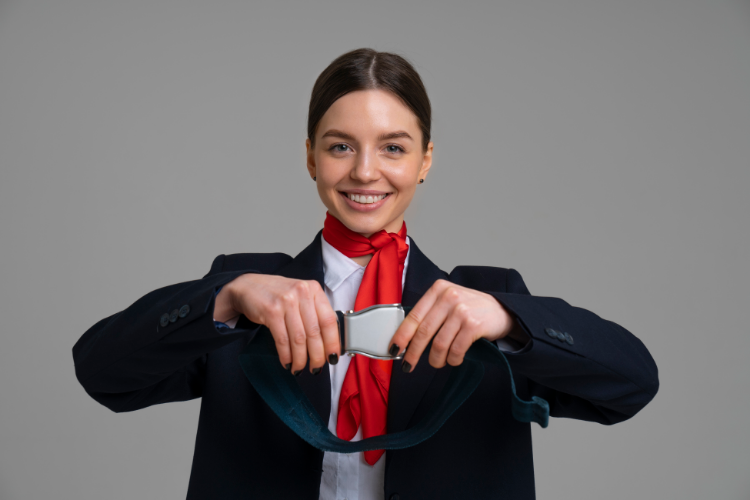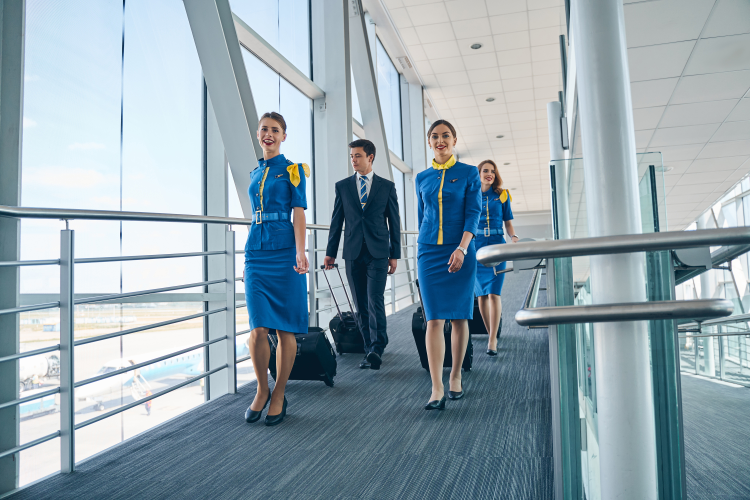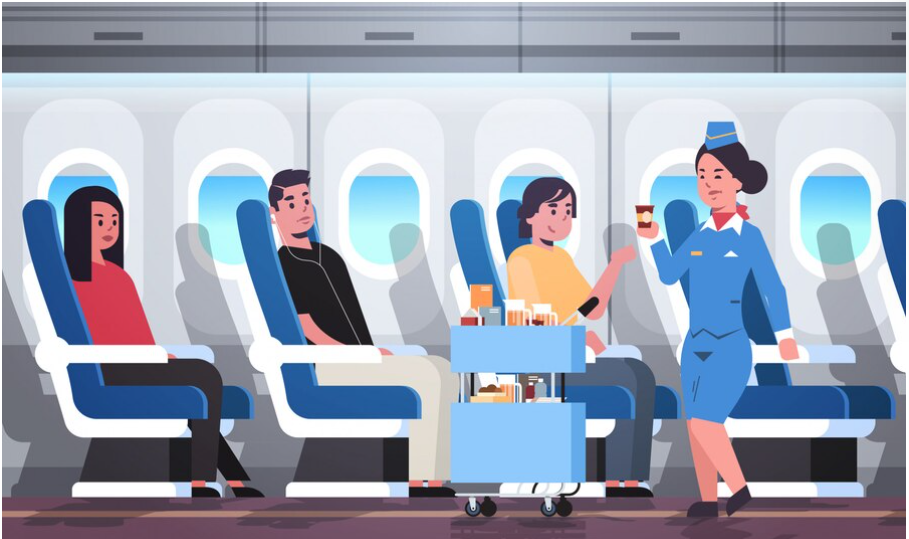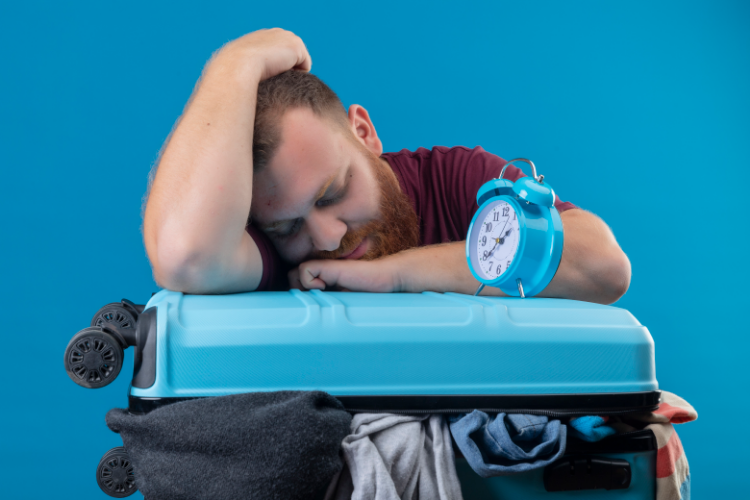Singapore’s airlines set a high bar: polished service, precise communication, and a safety-first mindset. In 2025, assessment days often include group tasks, brief role-plays, and quick interviews that reward concise, well-structured answers.
Focus on composure under pressure, teamwork, and cultural sensitivity. English is essential; additional Asian languages can help on specific routes. The sections that follow cover the top cabin crew interview questions and how to answer with proof—short metrics, real examples, and a tone that matches premium service standards.
General Cabin Crew Interview Questions
1. Tell us briefly about yourself.
This is a guaranteed question in any cabin crew interview. So, you should be well prepared to answer smartly. The main intention behind asking this question is to know about yourself and observe your personality.
This includes the way you speak, the way you smile, the way you interact, and all other nonverbal postures of your body. So, take close care of presenting yourself in the best possible way.

At the same time, make sure to describe yourself well. Always remember that this is a cabin crew interview and answer accordingly, mentioning only relevant things that might be useful in the selection process.
Say a little about your family, birthplace, and educational background, and emphasise more on your strengths. Your strengths should seem useful from a cabin crew interview perspective.
Tip: Draft a 60–75 second story that links your background to the role: service mindset, safety awareness, and teamwork. Structure it as Present → Past → Future. End with one concrete proof point (e.g., “handled 40+ passengers per shift at X venue”). Practise with a timer so it sounds natural and fits comfortably without rushing.
Also read: How to Answer Tell Me About Yourself in an Interview
2. What are your best qualities that might be useful as a cabin crew member?
Since this is a direct cabin crew interview question, your answer should also be relevant. Qualities like I’m a good athlete or a professional dancer might not be the answers the interviewer seeks. Instead, describe qualities that might be required for a cabin crew job.
Patience, teamwork, quick thinking, and fast learning would impress the interviewer.
Sample Answer – “I am a very patient person. Anger doesn’t trigger me that easily, and even if, in rare cases, it does, I’m used to being more logical and wittier than just bursting out without a thought.
Plus, whatever the situation, I like to stay positive and spread positivity to make people smile. Also, I’m an extrovert and very comfortable getting along with all kinds of people.”
Tip: Match each quality to a flight scenario: patience → delayed boarding; teamwork → cross-checking doors; quick thinking → medical alert; fast learning → new aircraft type. Add micro-metrics where you can (e.g., “resolved five passenger complaints on a single shift”). This converts traits into evidence and helps you avoid generic claims.

Also read: Cabin Crew Job Description, Key Skills & Salary
3. How many languages can you speak?
Answer the list of all possible languages you can speak. Also, mention how fluent you are in reading, writing, and speaking each of those languages.
If there is any language that you know barely enough to understand what others are saying, but cannot talk back, then mention that also, as that might be taken into consideration as a plus point about you.
Also, strictly remember not to lie about knowing any extra languages that you are not aware of as that would land you in trouble in the future.
Tip: State proficiency clearly: “English (fluent: read/write/speak), Hindi (fluent), Arabic (basic conversational).” If certified, cite the credential or context (e.g., “A2 classroom level” or “served international passengers weekly”). Mention any PA or safety-announcement practice, as clarity and diction matter as much as the number of languages.
4. Which are you better at? Team Work or Alone?
This is another sure-shot cabin crew interview question. There are no public flights or airlines that work with only one flight attendant per flight.
So, all flight attendants have to travel in groups (a group of 2 or even a group of 10 or 15). Hence, when asked about teamwork or working alone in the cabin crew interview, everyone should surely answer that teamwork as that would be the answer that the interviewer wants. But there is something else to keep in mind.
Although your choice is going to be teamwork, don’t answer that in such a way that the interviewer gets the feeling that you are incapable or too insecure to work alone. There might be times when an air hostess has to work by herself, when she alone is assigned to any special guests or if a fellow air hostess falls sick.
Also, in emergencies, being quick and witty as an individual is very much essential for every flight attendant. This is the reason why your answer should indicate that you are good at both.
Tip: Use a balanced line: “I thrive in crews because communication keeps operations safe, and I’m comfortable taking ownership when needed.” Add one brief example for each: a time you supported a teammate under pressure, and a moment you handled a task solo (e.g., VIP assistance or galley prep) without supervision.
5. Why Did You Choose This Career Out of Many Others?
Do not mention points like because flight attendants earn a lot or because I am not good at anything else. Do not even give answers like “There is no reason, I just wanted to casually give it a try”. These answers would take you a step down in the interviewer’s analysis towards hiring you.
Instead, your answer should give a feeling that there is a reason and purpose for you choosing this career path. It should give an assurance that you are 100% invested in this. These are the type of answers that are expected in any cabin crew interview.
Hence, if you want to impress the interviewer, then be honest and make it sound like you are really excited and looking forward to learning and growing in this profession as a flight attendant. ‘Good communication skills, like to travel, always being a people’s person, etc. are some of the points that should be surely mentioned.
Tip: Anchor your reason to safety and service, not travel alone. Try a two-part answer: purpose (“keeping people safe and calm at 35,000 ft”) + proof (“volunteered in high-footfall events; trained in first aid”). Close with growth: mention interest in progressing to senior crew or safety trainer over time.
6. Why do you prefer our Airlines out of all?
Every cabin crew interview question is designed to uncover all the positive traits inside you that would be helpful for the airline. This is a known fact, so everyone attending the interview will give answers accordingly.
So, if you want to stand out of the crowd then these are the types of questions that you should answer with care. Before the interview, make sure to do lots of research and background check on the airline company that you are attending the cabin crew interview for.
It would impress the interviewer if you answered this question about this particular airline.
Know about the awards and certificates the airline company receives and say working with a company with such good merits would be exciting.
Learn about the airline guidelines and policies and say you are perfectly on board for such a working environment.
Tip: Prepare three specifics: a recent award or safety milestone, a customer-experience initiative (e.g., new cabin product), and a route or fleet expansion. Link each point to what you can contribute. Keep it current; quoting outdated news weakens credibility. If you’ve flown with them, add one genuine observation about service quality.
7. Would it be okay if you had to travel long distances away from your family?
Long flights and traveling across the world away from family are two significant challenges experienced by all cabin crew members. Hence, it is a must in any cabin crew interview to find out your opinion and attitude towards this.

So, your answer should not sound like you cannot handle such pressure. You have to give assurance that you will be fine with it. Instead of simply answering with “Yes, I will be ok”, provide a more practical answer. Try to be reasonable as to why.
Give a logical explanation like, “I will be okay, as this isn’t the first time staying away from family. I have done it before during my six years of high school and college. Besides, there have always been advancements in communication, such as calling them and video chat.”
Tip: Show you’ve thought about wellbeing: mention a routine for sleep, hydration, and movement on layovers; planned check-ins with family; and boundaries for screen time. Emphasise reliability: you manage homesickness without affecting performance or punctuality. One sentence about previous relocation or hostel life strengthens your case.
Most Asked Cabin Crew Interview Questions for Freshers
8. What do you think are some common and regular duties of flight attendants?
Firstly, answer that taking care of the passengers all along their journey in the flight is the key task. Greeting them, giving safety instructions, serving them food or beverages, answering their queries, etc. are some of the tasks to mention.
Stress this point further by saying another line or 2 related to customer safety and customer comfort. To sound more impressive, say that the flight attendant has to do her best to make every passenger remember the service for a lifetime, making them want to prefer the same flight for the next time.
Next, talk about patiently dealing with circumstances like dealing with rude passengers, noisy kids, solving disputes between passengers, and so on. Finally, talk about the typical duties that the cabin crew is trained for during emergencies and critical situations.
Tip: Organise your answer by phases: pre-flight (briefing, checks), boarding (greet, assist), in-flight (service, safety), descent (secure cabin), post-flight (cross-check, reports). This structure shows you understand flow and prioritisation. Add one safety duty in each phase so you’re not seen as “service-only”.
9. What do you consider the most difficult thing about this job?
Stay honest and answer what exactly do you think would be difficult as a cabin crew. Dealing with rude passengers, staying completely active while working on long flights, and smiling and being positive even when dealing with any personal issues of our own are some of the most commonly mentioned points.
Tip: Pair the challenge with a coping method: rude passengers → de-escalation steps; fatigue → sleep hygiene and caffeine timing; irregular meals → healthy snacks and hydration. Keep it practical, not dramatic. End with how you’d seek support (cabin supervisor, EAP resources) without offloading responsibility.
10. Should a cabin crew know about emergency exits?
Yes. All flight attendants should learn about emergency exits from the emergency evacuation training. You should know how to open or close emergency exits, when exactly to use them, and whether using the emergency exit would make things worse or would be helpful.
Tip: Add one or two specifics to show realism: “arm/disarm doors under supervision,” “brief exit-row passengers,” or “assess outside conditions before opening.” If you’ve practised on mock doors, say so. Accuracy matters more than bravado when safety is in question.
11. What is the one quality that every cabin crew member should have?
Charismatic, patient, and good communication skills are the most important qualities. Analyze yourself and decide which of these three do you possess the most. Stick to that quality and explain why that quality is the most important for cabin crew members.
Then, slowly notify them that you very well possess that quality. If possible, give related real-life examples that give the interviewer the guarantee that you are not lying.
Tip: Choose one anchor trait, then back it up with a micro-story using STAR: Situation, Task, Action, Result. Keep the example short (20–25 seconds) and measurable (“recovered a service lapse; obtained positive feedback from two passengers”). Avoid listing five traits with no proof.
12. What are some things that you should not carry while traveling in flight?
Harmful chemicals, illegal medicines and drugs, explosives, weapons, poisonous food, and other substances are some of the things that are strictly prohibited to carry on a flight.
Tip: Frame it as categories: prohibited (weapons, explosives), restricted (battery watt-hours, liquids), and country-specific bans (certain foods/medications). Mention that crew must follow airline lists and IATA rules, and you’d politely guide passengers to declare items or check them if required.
Situation Based Interview Questions for Cabin Crew
13. If you had to work on a 16-hour flight, how would you deal with stress after such long flights?
Be clear that you know that you have to deal with jet lag. Give the clarity that you are health conscious. It would be an added plus point to know that you are thoughtful enough to take care of your health and not get into trouble before returning to work for the next flight. Stress that you would give the first preference for nothing but a good sleep after the journey.
Mention points like preparing the mind for jet lag and strictly taking a long nap after landing, even if it’s morning or evening. Eating strategically to get your body used to jet lag is another point that you can add.
Tip: Mention pre-flight pacing (hydration, steady caffeine), in-flight micro-breaks, light stretching, and post-flight wind-down (dark room, eye mask, meal timing to destination clock). Show you can reset quickly while meeting duty-time rules. One line on avoiding alcohol immediately after landing signals maturity.
14. What will you do if a passenger is unsatisfied with your service or is being rude to you for no reason?
Remember that patience is the key in such situations. Do not answer that you are going to strongly defend yourself or take the issue to higher authorities. Instead, answer that you are going to politely ask and find out what is troubling the customer.

Being empathetic about the situation is one quality that the interviewer will be looking for in your answer.
Trying to rectify the passenger’s issue in the best possible way, patiently explaining what caused the issue in the first place, and suggesting alternatives, when the issue cannot be satisfied in the way the passenger wanted, are some of the answers that would impress the interviewer.
When the passenger is too rude for no reason, then the flight attendants are expected not to thoughtlessly shout back disrupting the entire flight, and are instead expected to defend themselves smartly in such a way that the issue is silenced as quickly as possible.
Tip: Use a simple script: Acknowledge (“I can see this is frustrating”), Ask (“May I check what went wrong?”), Act (offer solution/alternative), and Anchor (“I’ll follow up in ten minutes”). Keep your tone low and steady; escalate discreetly only if safety or abuse lines are crossed.
15. If there is rough weather leading to air turbulence, then what should you do as a cabin crew?
Say a few points about air turbulence. Also, turbulence is considered normal and not a severe issue.
Serving food and beverages must be stopped during turbulence, as there will be shaking. The cabin crew should hold one hand for support and continue working to help the passengers when the turbulence is mild.
The flight attendants are responsible for ensuring passenger safety during turbulence by ensuring all passengers have their seat belts on and assisting them if anyone needs one.
Also, mention that in severe turbulence grades, the flight attendants should stick to their seats with the seat belts on and can only give verbal guidance to the passengers.
Tip: Layer your response by severity: light (secure carts, remind belts), moderate (suspend service, check lavatories when safe), severe (sit down, belts on, PA reassurance). Mention post-event checks for injuries and cabin condition, then a calm service recovery once the Captain clears movement.
16. How will you step in if two passengers are fighting?
Things that a flight attendant should do in such situations are:
- Talk to both of them and patiently find out what the issue is.
- Think quickly about any solution for the issue
- If possible, request other passengers and shift them to different seats
- Ask them what they would suggest to do to let of the issue
- Be as charismatic as possible to cool down the angry atmosphere between the passengers
Tip: Keep distance and open posture; use names if available; separate parties before facts-finding. Avoid blame language. Offer practical fixes (seat swap, service compromise) and log the incident for the In-Flight Manager. If it escalates towards safety risk, inform the flight deck per procedure.
Technical Questions Asked in Cabin Crew Interview
17. How should cabin crew deal with medical emergencies?
Talk about administering oxygen to passengers who are running short of breath, calling out for any doctors on the flight, and assisting them with the medical kit stored in the flight, the CPR training, etc. Answer the question so that the interviewer understands that you know these types of emergencies should be dealt with carefully and responsibly.
Also, mention if you have any prior experience in the medical field or in dealing with medical emergencies during your earlier education or professional life.
Tip: Structure: Assess (DRSABCD), Notify (call for medical help; inform flight deck), Assist (oxygen/first aid kit/AED as trained), Document (incident form). Mention privacy, consent, and infection control (gloves). Accuracy and calm process matter more than medical jargon.
18. How should cabin crew deal with fire disasters?
It is important to sound confident while answering these questions. The interviewer should know that you are brave enough not to back off and step up inside for the safety of the passengers.
Talk about acting quickly, guiding passengers to the safe part of the flight, carefully evacuating all the passengers in the fastest time possible, calming down the passengers as they were tensed, strictly instructing them about what to and what not to do, etc. Assure the interviewer that you are sharp enough for emergencies like this.
Tip: Use PBE + correct extinguisher type (Halon/water mist) depending on source (electrical, waste bin, galley). Call out roles: one fights the fire, one backs up, one communicates. Isolate power if safe. Reassess for re-ignition and smoke; then brief passengers clearly.
19. What is jet lag?
Jet lag is a sleep disorder that affects people traveling long flights from east to west or vice versa. The condition occurs when the mind and body are not prepared to handle the repetition of the same time of day due to the change in time zones after traveling halfway across the globe within hours of flight. Jet lag affects the sleep cycle and the food cycle of the person, but it is still temporary.
Tip: Show you manage it: shift sleep gradually before duty if practical, hydrate, daylight exposure at destination, short naps (20–30 mins) rather than long daytime sleep, light meals, and avoid alcohol. Mention you follow company fatigue policies and self-declare if unfit.

20. What is Air Turbulence?
Turbulence is caused by disrupted air flows which are caused due to differences in air pressure. Spend some time on such technical cabin crew interview questions to answer them professionally, assuring the interviewer that you clearly know what you are talking about.
Tip: Add simple passenger language: “bumps from changing air currents.” Emphasise prevention: seat-belt sign compliance, securing galley items, and pausing hot-liquid service. Reassure without minimising: acknowledge discomfort but stress aircraft are built for it.
Conclusion on Cabin Crew Interview Questions
Always remember to be yourself and never lie in any aspects in the cabin crew interview. Having a negative attitude or off-putting personality will not at all work for the interview, so maintain a positive mindset all through the interview process.
Always maintain a smile, but also make sure that your smile is not fake but is pleasant and genuine.
Cabin crew interview questions are not always technical. Many are personal, where the interviewer tries to test your attitude and your characteristics that might be useful for their airline. Hence, always remember not to look surprised or get off guard, no matter what the question is.
FAQs on BPO Interview Questions for Freshers
Q1. What are the top cabin crew interview questions and how should I answer them?
Expect “Why cabin crew?”, “Why our airline?”, “Handling difficult passengers”, teamwork, languages, and basic safety scenarios. Keep answers under a minute, show service mindset and calm judgement, and align to the airline’s values. Use one short result-based example for credibility and avoid vague claims.
Q2. How can I best answer “Why do you want to work for our airline” in a cabin crew interview?
Reference two or three specifics: service ratings, safety record, fleet/routes, or a customer initiative. Link each point to how you’ll contribute (languages, service recovery, safety focus). Keep it recent, genuine, and concise. If you’ve flown with them, add one real observation about onboard experience.
Q3. How do I prepare for behavioural questions in a cabin crew interview?
Use STAR: Situation, Task, Action, Result. Prepare three stories—service recovery, conflict resolution, and supporting a teammate. Keep each to 45–60 seconds with measurable outcomes (complaint resolved, CSAT improved). Emphasise empathy, communication, and safety awareness. Practise aloud so delivery is clear and calm.
Q4. What are the most important qualities airlines look for in cabin crew candidates?
Clear communication, teamwork, adaptability, situational awareness, and composure under pressure. Add safety discipline, cultural sensitivity, and professional grooming. Languages and physical stamina help. Support each with a brief example—e.g., assisting a medical alert or coordinating during delays—to turn traits into evidence.
Q5. How should I answer questions about handling emergencies as a cabin crew member?
Show a methodical, safety-first approach: follow SOPs, coordinate with crew, communicate clearly with passengers, and escalate to the flight deck when required. Mention training readiness (initial and recurrent) and accurate documentation. Avoid bravado; precision and teamwork matter most in emergency responses.
Q6. What are the basic questions asked in a cabin crew interview?
Common items: “Tell me about yourself”, motivation for the role/airline, strengths and weaknesses, languages, teamwork vs working alone, availability to travel/relocate, grooming standards, and simple safety scenarios (turbulence, medical alert). Prepare concise, role-relevant answers with one outcome or metric where possible.
Q7. How do I introduce myself in a cabin crew interview?
Use Present–Past–Future: who you are now (service/safety focus, languages), relevant past experience (customer-facing roles, teamwork), and what you want next with this airline. Keep it 60–75 seconds, include one measurable achievement, and end with how you fit their brand standards.
Q8. What are the salary expectations for cabin crew?
Pay varies by airline and base: a fixed salary plus flying allowances, layover allowances, and incentives. Research typical ranges for your region and present a reasonable range. Emphasise flexibility and overall package, training, roster pattern, allowances, and progression, not just base pay.
Q9. What skills are needed to be cabin crew?
Customer service, communication, teamwork, situational awareness, and calm problem-solving. Add time management, language ability, cultural sensitivity, physical stamina, and strict safety discipline. Illustrate briefly, e.g., defusing a complaint or assisting a special-needs passenger, so skills read as proven, not theoretical.
Q10. What is your weakness best answer for cabin crew?
Choose a real but non-critical area (e.g., initial nerves with announcements). Explain actions taken, practice runs, feedback from seniors, voice coaching, and the result (clearer PA delivery, positive evaluation). Avoid weaknesses that conflict with safety, punctuality, or teamwork. Keep it honest and solution-focused.




